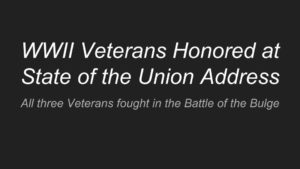By Debbie Gregory.
Three World War II heroes, Pvt. 1st Class Joseph Reilly, Staff Sergeant Irving Locker, and Sergeant Herman Zeitchik were recognized at the State of the Union address. All three fought in the Battle of the Bulge.
Like most from the Greatest Generation, 97-year-old Joseph Reilly was one was of 16 million Americans to serve his nation during World War II. Born in Janesville, Wisconsin, Reilly enlisted into the Army as a paratrooper. He served with the 101st Airborne while parachuting into France as part of the June 1944 D-Day invasion. He then went on to fight at Bastogne in the Battle of the Bulge.
Today, Reilly continues to mentor thousands of youth through a significant number of annual speaking engagements, school appointments and business meetings providing his insight into the human element of WWII.
Locker, from Passaic, New Jersey, said the hard part about D-Day was simply getting ashore. He was in charge of a gun in an anti-aircraft artillery battery, and all members of his unit were weighed down with heavy equipment and ammunition.
Zeitchik was knighted a Chevalier with the French Legion of Honor for aiding in the liberation of Paris. He was among the first U.S. troops to enter Paris. He said they pulled in at night and slept in the streets. The next morning, the Parisians saw them and the celebration began.
Both Locker and Zeitchik were present when the Nazi extermination camps were liberated by U.S. forces.
Seated next to Zeitchik was 90-year-old Joshua Kaufman, a survivor of Dachau who was liberated by Zeitchik and other Americans.
Illustrating the the widespread helplessness at the time; Locker, who knew Yiddish and some German, said he spoke to German civilians in the nearby towns. They stated that they did not know about the camps existence or if they did they had no knowledge of what went on there. He said he would ask in an attempt to better understand the lack of involvement, “How come you never stopped it? How come you never said anything?” Unfortunately their answers reflected the self-preservation that was prevalent for that time and situation, for if they felt that if they spoke up, they would have found themselves in the camps as well.
According to the U.S. Department of Veterans Affairs, less than 497,000 of the 16 million Americans who served in World War II were still alive in 2018. It is wise for us as a Nation to actively engage with those that remain so that we can hear their first hand accounts of what they lived through as they protected our country and the rest of the world.
By embracing and remembering the courage, bravery, and patriotism shown by all of our country’s veterans, hopefully we can learn from these experiences and find a more common ground; as we work towards continual improvements and enduring peace.
Veteran and Military Business Owners Association, VAMBOA,








